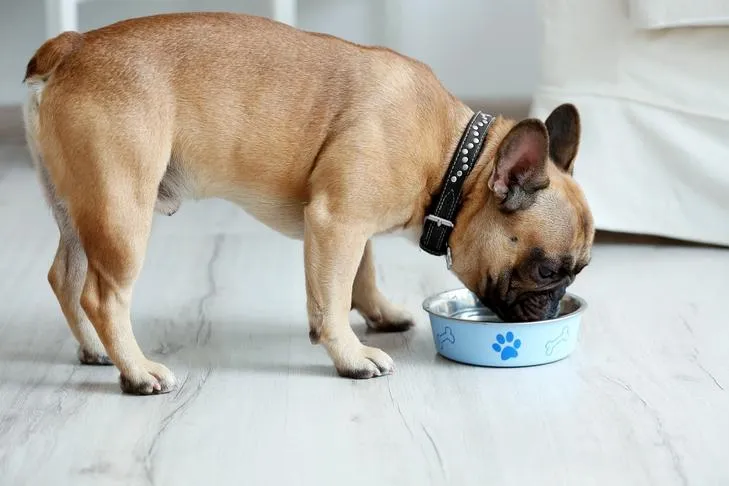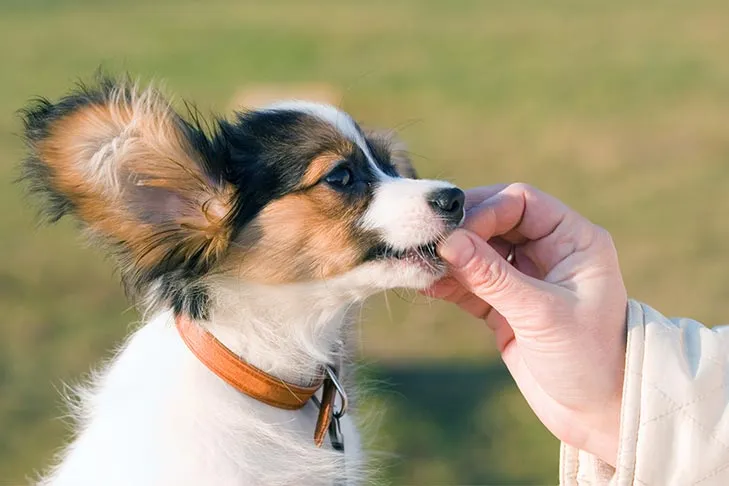As a loving dog owner, it’s natural to wonder if you can share a bite of your favorite snack with your furry friend. The sight of those pleading puppy eyes can be hard to resist! While many human foods are perfectly safe and even beneficial for dogs in moderation, others can be highly toxic or cause digestive upset. Knowing the difference is crucial for your pet’s health and well-being. This comprehensive guide from Dog Care Story will help you navigate the world of human snacks, outlining what’s safe, what to avoid, and important considerations to keep your canine companion happy and healthy.
Before diving into specific foods, it’s vital to establish some general guidelines. Your dog’s diet should primarily consist of high-quality dog food formulated for their specific needs. Human snacks should always be given as occasional treats and never replace a balanced meal. Always introduce new foods slowly and in small quantities to monitor for any adverse reactions. If you’re ever unsure about a particular food, it’s best to consult your veterinarian. Remember, every dog is unique, and what’s fine for one might not be for another.
General Guidelines for Feeding Human Snacks to Your Dog
When considering sharing your snacks, keep these essential principles in mind:
- Moderation is Key: Even healthy human foods should be given sparingly. Too much of a good thing can lead to weight gain or digestive issues. Treats should make up no more than 10% of your dog’s daily caloric intake.
- Avoid Seasonings and Additives: Many human foods are prepared with salt, sugar, spices, onions, garlic, or artificial sweeteners (like xylitol), all of which can be harmful to dogs. Always offer plain, unseasoned food.
- Check for Toxic Ingredients: Be vigilant about ingredients that are highly toxic to dogs, such as chocolate, grapes, raisins, onions, garlic, avocado, and macadamia nuts.
- Proper Preparation: Ensure foods are cooked thoroughly, boneless, and cut into small, manageable pieces to prevent choking hazards or internal injuries. Remove all seeds, pits, and tough skins.
- Watch for Allergies: Just like humans, dogs can develop allergies to certain foods. Observe your dog for any signs of discomfort, vomiting, diarrhea, or skin irritations after introducing a new food. If your dog experiences an upset stomach or allergic reaction, check out our guide on what vegetables are dogs not allowed to understand potential triggers beyond just vegetables.
Safe & Healthy Human Snacks for Dogs
Here’s a detailed look at common human foods that are generally considered safe for dogs, along with important tips for serving them.
Bread
Small amounts of plain, unseasoned bread are typically safe for dogs. However, it offers no significant nutritional benefits and is high in carbohydrates and calories. Avoid breads containing spices, nuts, or especially raisins, which are toxic to dogs. While homemade bread might seem like a better option due to fewer preservatives, store-bought bread is generally fine in very limited quantities. It’s best reserved for special occasions and offered as an infrequent treat.
Cashews
Cashews can be a safe treat for dogs when given in moderation. They contain beneficial nutrients like calcium, magnesium, antioxidants, and protein. However, cashews are also high in fat, so consuming too many can lead to weight gain and potentially pancreatitis. Always offer unsalted, plain cashews and only a few at a time as a special reward.
Cheese
Cheese can be a delightful treat for dogs in small to moderate portions, provided your dog isn’t lactose intolerant. While rare, some dogs can have difficulty digesting dairy. Look for lower-fat varieties like cottage cheese or mozzarella to prevent excessive fat intake, which can lead to digestive upset or contribute to weight issues. Many dogs also enjoy specialized dog chews made from dried cheese, offering a safer, dog-specific alternative.
 Close-up of a dog looking intently at a block of cheese on a kitchen counter.
Close-up of a dog looking intently at a block of cheese on a kitchen counter.
Coconut
This versatile fruit offers several health benefits for dogs. Coconut contains lauric acid, known for its antiviral and antibacterial properties. It can also help improve bad breath and soothe certain skin conditions like hot spots, flea allergies, and general itchy skin. Both coconut milk and coconut oil are safe for dogs. Just ensure that any coconut offered is free from the tough, fibrous outer shell, which can be a choking hazard or cause intestinal blockage if ingested.
Corn
Corn is a common ingredient in many commercial dog foods, so it’s generally safe for dogs to eat. It provides vitamins, minerals, and fiber. However, the corn cob itself is indigestible and can cause a serious intestinal blockage, requiring emergency veterinary attention. Always remove the kernels from the cob before sharing corn with your dog.
Eggs
Cooked eggs are an excellent source of protein and can be a fantastic addition to your dog’s diet. They are easily digestible and can even help soothe an upset stomach. It’s crucial to ensure eggs are fully cooked (scrambled, boiled, or fried without oil/seasoning) as raw egg whites contain avidin, which can interfere with biotin absorption, potentially leading to a biotin deficiency over time.
Fish
Cooked fish, particularly salmon and sardines, can offer a substantial health boost for your dog. Fish is rich in healthy fats, essential amino acids, and omega-3 fatty acids, promoting healthy skin, coat, joints, and brain function. Salmon provides vitamins and protein, while sardines offer easily digestible bones for extra calcium. Always ensure fish is fully cooked and all bones (except for the soft bones in sardines) are meticulously removed. Never feed raw or undercooked fish, as it can contain harmful parasites that cause severe illness. Limit fish intake to once or twice a week.
Ham
While a tiny piece of ham might not be immediately harmful, it’s not the healthiest choice for your dog. Ham is notoriously high in sodium and fat, which can lead to digestive issues, pancreatitis, or contribute to obesity if fed regularly. It’s best kept as a very rare treat, if at all, and only given in minimal amounts.
Honey
Honey is packed with a wide array of nutrients, including various vitamins, minerals (potassium, calcium, magnesium, copper), and antioxidants. Small amounts of local honey can even help dogs with seasonal allergies by gradually introducing small amounts of pollen, building immunity. Beyond consumption, honey’s natural antibacterial properties make it a traditional topical treatment for minor burns and superficial cuts.
 A French Bulldog enjoys a meal from its bowl indoors, demonstrating healthy eating habits.
A French Bulldog enjoys a meal from its bowl indoors, demonstrating healthy eating habits.
Milk
Dogs can have small amounts of milk, but caution is advised. Many dogs are lactose intolerant, meaning they lack the enzyme to properly digest lactose, leading to digestive upset like diarrhea. If you choose to offer milk, start with a tiny amount and observe your dog for any adverse reactions. For most dogs, water remains the best and safest beverage.
Peanut Butter
Peanut butter is a popular dog treat, and for good reason. It’s an excellent source of protein, heart-healthy fats, and vitamins B and E. The healthiest option is raw, unsalted peanut butter. However, it’s absolutely critical to read the label carefully and ensure it does not contain xylitol, an artificial sweetener that is highly toxic and potentially fatal to dogs. For more specific dietary needs, such as what human food can german shepherds eat, always prioritize plain, natural ingredients.
Peanuts
Unlike some other nuts (like almonds), plain, unsalted peanuts are generally safe for dogs. They provide beneficial fats and proteins. However, due to their high-fat content, peanuts should only be given in moderation to prevent weight gain and potential issues like pancreatitis. Always ensure they are unsalted, as too much sodium can be detrimental to a dog’s health.
Popcorn
Air-popped popcorn, served plain (without salt, butter, or other toppings), can be a fun, light snack for your dog in moderation. It contains riboflavin and thiamine, which support eye health and digestion, along with small amounts of iron and protein. Crucially, make sure all kernels are fully popped, as unpopped kernels can pose a serious choking hazard or cause dental damage.
Pork
Cooked pork is a highly digestible protein source, rich in amino acids. It can be a good alternative protein for dogs with allergies to more common meats like chicken or beef. While beneficial, pork tends to have more calories per pound than some other meats, so serve it in moderation. Always ensure it’s thoroughly cooked and unseasoned, with all excess fat and bones removed. To understand more about problematic meats, you might want to review what meat you should not feed your dog.
Quinoa
Quinoa has gained popularity in human and pet diets alike due to its impressive nutritional profile. It’s a complete protein and a healthy alternative to common starches like corn, wheat, and soy, often found in high-quality dry dog foods. When prepared simply by boiling it in water without any seasonings, quinoa can be a beneficial addition to your dog’s diet.
 An adorable Samoyed puppy rests peacefully in green grass outdoors.
An adorable Samoyed puppy rests peacefully in green grass outdoors.
Salmon
As highlighted earlier, fully cooked salmon is a powerhouse of nutrients for dogs. It’s packed with protein, healthy fats, and omega-3 fatty acids, which significantly benefit joint health, brain function, and immune system strength. It is imperative that salmon is cooked all the way through; raw or undercooked salmon can harbor parasites that cause severe, even fatal, “salmon poisoning” disease in dogs, leading to symptoms like vomiting, diarrhea, and dehydration.
Shrimp
A few cooked shrimp, offered occasionally, can be a healthy treat for your dog. Shrimp are low in fat, calories, and carbohydrates, while being rich in antioxidants, vitamin B-12, and phosphorus. Always ensure the shrimp are fully cooked and that the shell, tail, head, and legs are completely removed before serving to prevent choking or digestive issues.
Tuna
Cooked, fresh tuna can be an excellent source of omega-3 fatty acids, promoting heart and eye health, when given in small amounts. However, canned tuna, especially tuna packed in oil, should be offered sparingly due to its potential for higher mercury and sodium content. If offering canned tuna, choose varieties packed in water and ensure it contains no added spices or flavorings.
Turkey
Plain, cooked turkey is generally safe for dogs. It’s a good source of lean protein. Before feeding, always remove any excess fat, skin, and especially bones. Poultry bones can splinter easily, causing blockages or tears in your dog’s digestive tract. Avoid any turkey prepared with excessive salt, seasonings, onions, or garlic, as these can be harmful. In certain health conditions, like pancreatitis, understanding what should a dog with pancreatitis not eat becomes critical for their recovery and ongoing health.
Wheat or Grains
Contrary to popular belief, grains are not inherently bad for dogs. In fact, many grains like wheat and corn are excellent sources of protein, essential fatty acids, and fiber, contributing to a healthy digestive system and overall vitality. Unless your dog has a confirmed grain allergy, there’s no need to avoid them. If you suspect an allergy, consult your veterinarian for proper diagnosis and dietary recommendations.
Yogurt
Plain yogurt can be a perfectly acceptable and even beneficial snack for dogs due to its probiotic content, which helps strengthen the digestive system. However, like milk, some dogs may have difficulty digesting dairy products. Always opt for plain yogurt with active cultures, and strictly avoid any varieties with added sugar, artificial sweeteners (especially xylitol), or fruit flavorings.
 A small Papillon puppy delicately takes a snack from a person's hand, illustrating careful feeding.
A small Papillon puppy delicately takes a snack from a person's hand, illustrating careful feeding.
What Human Foods Should Dogs NEVER Eat?
While this article focuses on safe snacks, it’s equally important to be aware of foods that are toxic to dogs. Always keep these items out of your dog’s reach:
- Chocolate: Contains theobromine, which is highly toxic.
- Grapes and Raisins: Can cause acute kidney failure.
- Onions and Garlic: Can lead to red blood cell damage.
- Avocado: Contains persin, which can cause vomiting and diarrhea.
- Xylitol: A sugar substitute found in many sugar-free products (gum, peanut butter) that causes a rapid insulin release and liver failure.
- Alcohol: Extremely dangerous, even in small amounts.
- Macadamia Nuts: Can cause weakness, vomiting, tremors, and hyperthermia.
- Cooked Bones: Can splinter and cause internal injuries.
When in Doubt, Consult Your Vet
Ultimately, your veterinarian is the best resource for advice on your dog’s diet and health. If you have any concerns about feeding human snacks, if your dog has specific health conditions (like allergies or pancreatitis), or if you suspect your dog has eaten something toxic, always contact your vet immediately.
Conclusion
Sharing human snacks with your dog can be a wonderful way to bond and provide varied nutrition, but it requires careful consideration and knowledge. By sticking to plain, unseasoned, and properly prepared foods from the safe list, and always remembering the importance of moderation, you can offer your canine companion delicious and healthy treats. Always prioritize your dog’s health and well-being, and when in doubt, a quick chat with your veterinarian can provide peace of mind. Explore more articles on Dog Care Story for expert advice on all aspects of pet care!
